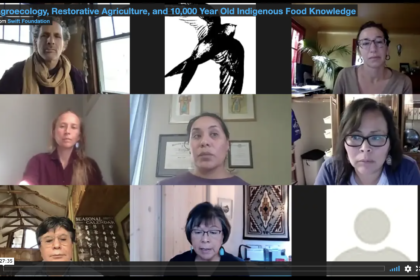AGROECOLOGY, RESTORATIVE AGRICULTURE, AND 10,000 YEAR-OLD INDIGENOUS FOOD KNOWLEDGE
About this webinar:
This webinar discusses and reflects on the ways the terms agroecology and regenerative agriculture as terms can be both helpful and harmful; how they have evolved over time as their meanings are disputed, contested and reconstituted to reflect changing social attitudes. It addresses the tensions around the meaning and application of these terms upon the biocultural heritage of historically oppressed groups as they seek to reclaim their identities and define themselves in reference to their own realities. It includes specific critique and recommendations for how to contextualize these important terms in a more inclusive manner, inspire action and deepen understanding and collaboration.
Description:
Farming, food gathering, artisanal fishing and hunting represent ways of life that are closely linked to indigenous peoples’ knowledge and traditions, community relations, and a deep seeded respect for Mother Earth. These systems nurtured practically all of the historically and agriculturally significant fruits, vegetables, and grains from regions across the globe; represent thousands of years of innovation; and therefore, hold the key to building any resilient food system.
“Agroecology” as well as “regenerative agriculture” are terms have come about in response to and defense against the industrial agribusiness empire. Otherwise “farming” would suffice, it would mean growing food with respect and understanding of the nuances of one’s home place. Alliances have formed around the conceptual framework of these terms, with agroecology being more associated with a scientific grounding and an international social movement, and regenerative agriculture being more of a U.S. centric term encompassing the specific protocols of organic, biodynamic and other such farming practices under an overarching heading. However, the conceptual evolution of these terms have also shown tendencies toward memorializing colonial perceptions of science and society ignoring or overriding the importance of indigenous peoples’ agricultural and food systems and its knowledge and practices – currently treated as a small component of Agroecology. Indigenous food systems evolved in the Americas over 10000 years ago and its practice continues strong and its culture vibrant; disregarding it limits our greater success as wider movement committed to maintain and strengthen diverse and healthy food systems, including building resilient ecosystems and cultural systems. “Agroecology”, “regenerative agriculture”, “organic”, etc. need to critically engage with Indigenous peoples’ peoples to deepen the debate about how to create a truly holistic approach to food systems and set inclusive research priorities, funding opportunities, and bottom up policies for a transformative food system.
Philanthropy has an important role in all of this. Program areas are often defined by the above-mentioned terms. Different understandings of regenerative farming and agroecology create contexts where contrasting agricultural development narratives thrive. While both terms have an enduring purpose, as funders committed to supporting indigenous farmers directly (as well as hunters, fisher folk and harvesters), we invite you to make space in your own comprehension and practice for knowledge and language that does not fit into familiar categories.


